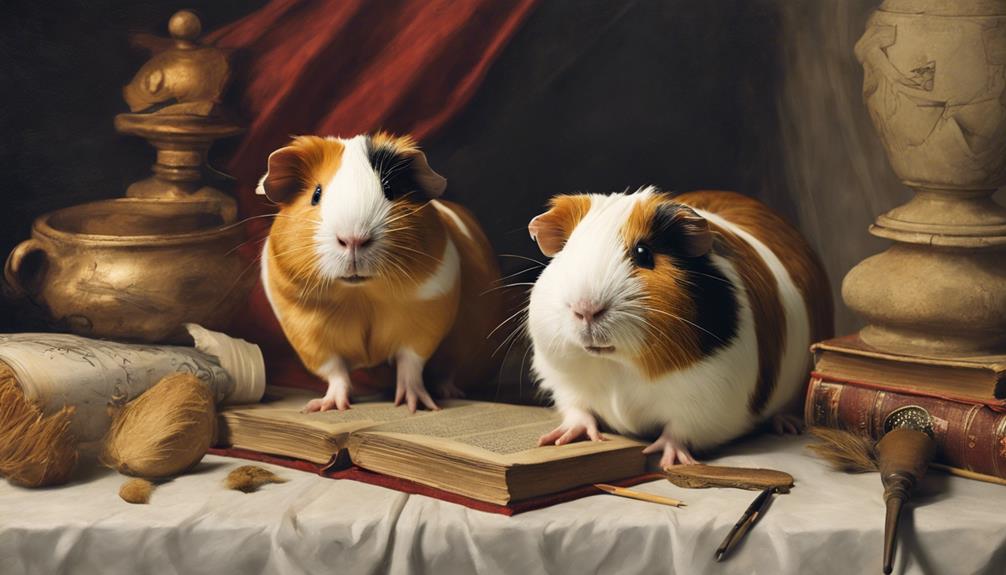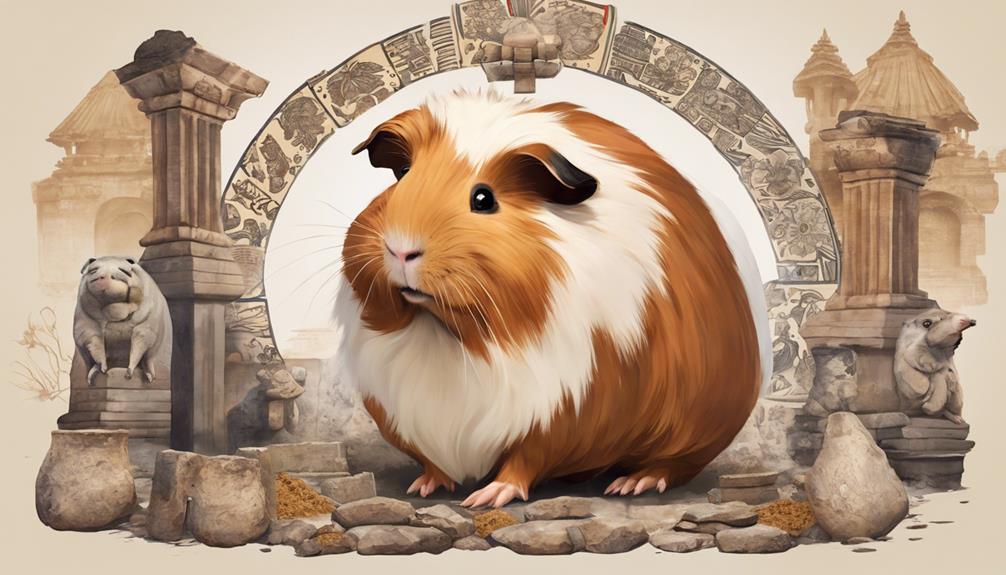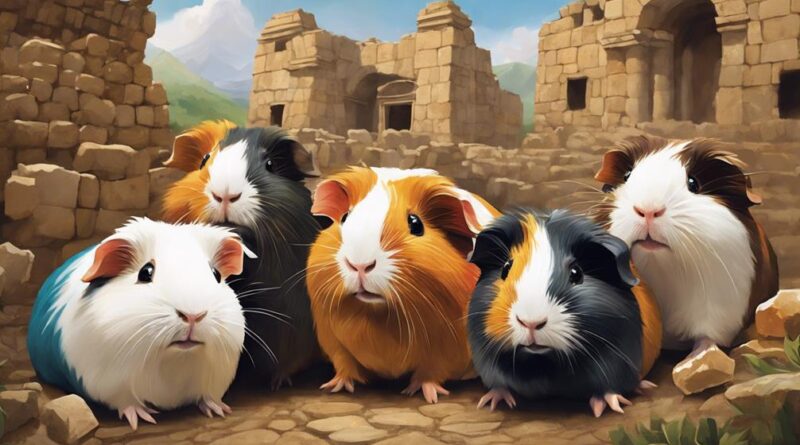Unveiling Guinea Pigs' Historical Importance and Origin
Imagine ancient civilizations using guinea pigs for more than just pets; these small creatures have a fascinating history worth exploring.
From being essential companions on European exploration voyages to playing crucial roles in scientific breakthroughs, the humble guinea pig has left its mark on various aspects of human society.
But there's more to this story than meets the eye. As you uncover the historical importance and origin of guinea pigs, you'll discover a narrative that spans across cultures and time periods, showcasing their significance in ways you might not have imagined.
Ancient Civilizations' Guinea Pig Use
The ancient civilizations utilized guinea pigs for various purposes, including food, religious ceremonies, and even as pets. Guinea pigs held immense cultural significance and historical relevance in these societies. In ancient practices and indigenous traditions, these small creatures played a crucial role.
In many ancient civilizations, guinea pigs were more than just a source of food; they were revered animals with symbolic importance. These furry creatures were often used in religious ceremonies and rituals. Their presence was believed to bring luck, prosperity, and protection. Guinea pigs were considered sacred animals, representing fertility and abundance in various cultures.
Moreover, guinea pigs were also kept as pets by the elite and nobility in some ancient societies. Their gentle nature and sociable behavior made them popular companions. These animals were pampered and well-cared for, showcasing the affection and value people placed on them.
The historical relevance of guinea pigs in ancient civilizations can't be understated. Their depictions in art, folklore, and literature further emphasize their significance in these cultures. Whether as a divine symbol in religious ceremonies or as beloved pets in noble households, guinea pigs were an integral part of daily life, reflecting the deep connection between humans and animals in ancient times.
Guinea Pigs in European Exploration
During the era of European exploration, guinea pigs served as essential companions to sailors on long voyages, providing both comfort and sustenance.
- Maritime Expeditions: Guinea pigs were brought aboard ships during maritime expeditions as a source of fresh meat. Their ability to reproduce quickly made them a sustainable food source for sailors facing long journeys.
- Cultural Exchange: Guinea pigs also played a role in cultural exchange between the European explorers and the indigenous populations they encountered. These small animals were often traded or gifted to establish friendly relations with native communities along the explored coasts.
- Exploration Impact: The presence of guinea pigs on European ships impacted the outcomes of exploratory voyages. Their presence provided a reliable food source, reducing the risk of malnutrition among sailors during prolonged expeditions.
- Trade Routes: As European explorers established new trade routes around the world, guinea pigs sometimes unintentionally found their way to different continents, where they became part of local fauna and cultures, further influencing trade dynamics and cultural interactions.
Guinea Pigs in Scientific Discoveries
Guinea pigs' historical significance extends beyond maritime expeditions to their crucial role in scientific discoveries. These small creatures have been instrumental in groundbreaking experiments that have paved the way for significant scientific breakthroughs. Guinea pigs have played a vital role in various studies, particularly in the fields of biology, medicine, and genetics.
One notable contribution of guinea pigs in scientific research is their use in studying scurvy, a disease caused by vitamin C deficiency. In the 18th century, guinea pigs were crucial in demonstrating that citrus fruits could prevent and cure scurvy, leading to a better understanding of the importance of vitamin C in human health.
Moreover, guinea pigs have been essential in genetic research, serving as a model organism for studying heredity and genetic disorders. Their reproductive biology and relatively short gestation period make them valuable in understanding inheritance patterns and gene expression.
In the field of pharmacology, guinea pigs have been used to test the safety and efficacy of new drugs before human trials. Their sensitivity to certain substances has helped researchers identify potential risks and side effects, contributing to the development of safer medications for humans.
Guinea Pigs as Companions
Once considered mere test subjects, guinea pigs have now emerged as beloved companions for many households. These charming creatures offer more than just their cute appearance; they provide emotional support and create strong bonds with their human caregivers.
Here are four reasons why guinea pigs make excellent companions:
- Emotional Support: Guinea pigs are intuitive animals that can sense when their owners are feeling down. They'll snuggle up to you, offering comfort and warmth during tough times, making them great emotional support animals.
- Bonding Activities: Spending time with your guinea pig can strengthen your bond and create lasting memories. Whether it's hand-feeding them their favorite treats, grooming them, or simply talking to them, these activities help build a strong connection.
- Playful Nature: Despite their small size, guinea pigs are playful and curious animals. Watching them popcorn with joy or zoom around their play area can bring a smile to anyone's face, making them delightful companions for both kids and adults.
- Low Maintenance: Guinea pigs are relatively low maintenance pets, making them ideal for busy individuals or families. With proper care and attention, they can thrive and provide companionship without requiring excessive time or effort.
Guinea Pigs in Art and Literature

Having inspired artists and writers for centuries, guinea pigs have left a lasting impression in the realm of art and literature. These adorable creatures have found their way into various cultural narratives, including mythology and folklore.
In mythology, guinea pigs have been depicted as symbols of abundance and fertility. For example, in Andean mythology, the guinea pig, or cuy, was considered a sacred animal and often used in religious ceremonies. The Incas believed that guinea pigs could communicate with the spirit world, adding a mystical element to their significance.
In folklore, guinea pigs have been portrayed as symbols of good luck and companionship. In some cultures, they're seen as bringers of fortune and prosperity, with their squeaks and chirps being interpreted as messages of positivity. Additionally, guinea pigs have been featured in various folk tales and fables as loyal companions to protagonists, showcasing their endearing qualities and gentle nature.
Artists and writers have drawn inspiration from guinea pigs' unique characteristics, incorporating them into paintings, poems, and stories. Their cute appearances and friendly demeanor make them beloved subjects in various artistic expressions, capturing the hearts of audiences worldwide. Guinea pigs continue to be celebrated in art and literature for their charm and lovable personalities, solidifying their place in cultural history.
Guinea Pigs' Role in Medicine
Exploring the significant contributions of guinea pigs to the field of medicine reveals their vital role in advancing scientific research and development. These small creatures have played an essential part in various medicine advancements and continue to be instrumental in laboratory testing. Here are four key ways guinea pigs have impacted the field of medicine:
- Drug Development: Guinea pigs are commonly used in preclinical drug testing due to their biological similarities to humans. They help researchers understand how new medications might work and their potential side effects before human trials.
- Vaccine Research: Guinea pigs have been crucial in the development of vaccines for diseases such as diphtheria, tuberculosis, and influenza. Their use in studying immune responses has been pivotal in creating effective vaccines.
- Allergy Studies: These animals have been instrumental in researching allergic reactions and testing new allergy treatments. Guinea pigs' immune systems closely resemble human immune responses, making them valuable in allergy studies.
- Surgical Techniques: Guinea pigs have aided in refining surgical techniques and procedures. Their use in surgical practice simulations has helped train and educate medical professionals, ensuring safer surgeries for humans.
Through their contributions to medicine advancements and laboratory testing, guinea pigs have proven to be indispensable in improving healthcare practices and saving lives.
Guinea Pigs' Symbolism in Culture

Guinea pigs' significance extends beyond their role in medicine to encompass their symbolic importance in various cultures worldwide. In many cultural traditions, guinea pigs hold symbolic meanings that go beyond their cuddly appearance. In folklore and superstitions, these small creatures often represent traits like abundance, fertility, and good fortune. For instance, in some South American cultures, guinea pigs are seen as symbols of prosperity and are sometimes used in rituals or ceremonies to attract wealth and success.
Moreover, guinea pigs are also associated with companionship and loyalty in various societies. In some folklore tales, they symbolize friendship and trust, highlighting their social nature and gentle demeanor. Additionally, guinea pigs are sometimes linked to divination practices or considered as spiritual guides in certain belief systems. Their behavior and interactions with humans are interpreted as signs or omens in different cultural contexts.
The symbolism of guinea pigs in culture serves as a reminder of the interconnectedness between humans and animals, emphasizing the emotional and spiritual bonds that can exist between different species. By exploring the symbolic significance of guinea pigs, we gain a deeper understanding of how these small creatures have woven themselves into the tapestry of human customs and beliefs throughout history.
Guinea Pigs in Modern Research
Recent advancements in scientific research have highlighted the unique role guinea pigs play in modern experimentation and discovery.
- Ethical Considerations: Guinea pigs are favored in research due to their physiological similarities to humans, reducing the need for more invasive procedures on other animals. This helps researchers adhere to strict ethical guidelines in animal testing.
- Genetic Modification: Guinea pigs are increasingly used in genetic modification studies for disease research. Their genetic makeup can be altered to mimic various human conditions, aiding in the development of treatments and cures for illnesses.
- Disease Research: Guinea pigs are valuable in studying infectious diseases like tuberculosis and influenza. Their susceptibility to certain pathogens makes them crucial in understanding disease progression and testing new vaccines.
- Contribution to Medical Advancements: Guinea pigs have contributed significantly to medical advancements such as the development of insulin for diabetes and the testing of antibiotics. Their role in ongoing research continues to pave the way for innovative treatments and therapies.
Frequently Asked Questions
Can Guinea Pigs Be Trained to Do Tricks or Perform Certain Tasks?
Yes, guinea pigs can be trained to do tricks or perform tasks. They're responsive to positive reinforcement training techniques but have limitations due to their short attention span.
Their cognitive abilities allow them to learn simple tasks, but the learning curve might be slower compared to other pets. With patience and consistency, you can teach them basic tricks like running through tunnels or responding to cues.
What Are Some Unique Breeds or Varieties of Guinea Pigs That Are Not Commonly Seen?
If you're looking for rare breeds and exotic varieties of guinea pigs, consider exploring genetic mutations that result in unique colors and patterns.
Some uncommon options include the Skinny pig, with little to no hair, and the Baldwin guinea pig, which has sparse hair.
Additionally, the Texel breed stands out with its long, curly fur, while the Merino variety showcases a luxurious, dense coat.
These distinct guinea pigs offer a fascinating twist to traditional pet choices.
Are There Any Superstitions or Myths Surrounding Guinea Pigs in Different Cultures?
In different cultures, superstitions and myths about guinea pigs abound. These beliefs showcase the diverse folklore surrounding these creatures.
From being seen as symbols of good luck to being associated with fertility and abundance, guinea pigs have played significant roles in various cultural beliefs.
It's fascinating to explore the rich tapestry of superstitions that have woven around these small but beloved animals throughout history.
How Do Guinea Pigs Communicate With Each Other and With Humans?
Guinea pigs communicate through a variety of vocal cues and body language. They make different sounds like squeaks, purrs, and wheeks to express their emotions.
Additionally, they use gestures like ear positioning and whisker movements to convey messages.
In social interactions, guinea pigs establish bonds through grooming, snuggling, and even gentle nibbling.
Understanding these communication methods can help you build a stronger connection with your guinea pig.
Are There Any Famous Historical Figures Who Were Known to Have Owned Guinea Pigs as Pets?
Many famous owners throughout history have cherished guinea pigs as pets. Their presence in the households of notable figures reflects the cultural impact and symbolism attached to these cuddly creatures.
From royalty to scholars, guinea pigs have been adored companions, adding a touch of joy and warmth to the lives of those who owned them.
Their historical significance goes beyond mere ownership, showcasing the universal appeal and endearing nature of these small animals.
Conclusion
You have now uncovered the fascinating history and importance of guinea pigs throughout various civilizations and time periods.
From their role in ancient civilizations to their use in scientific discoveries and even their symbolism in culture, guinea pigs have made a significant impact on human society.
Whether as companions, subjects of research, or symbols of artistic expression, these small animals have left a lasting mark on history and continue to be valued in various capacities today.
